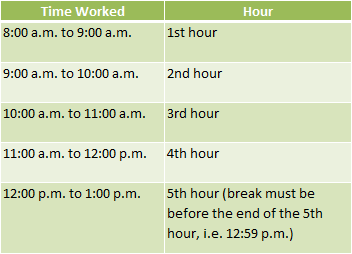
Your employer pays this extra hour at your regular rate for every day you didn’t receive a proper meal break.

If any of those things occur, you could be entitled to one extra hour of pay. Or your employer might make it impossible to take a meal break at all. Your employer may require or pressure you to work through your meal break or cut your break short.

There are several ways your employer may impede your meal break. What If My Employer Doesn’t Allow Me to Take My California Meal Break? However, you must still take your first meal break. If you work more than 10 hours but less than 12 hours, you can skip your second meal break. These “on-duty” paid periods often occur when the type of work you perform prevents you from leaving your workstation.įor example, if you work alone at night as a cashier in a convenience store and can’t leave your post, you likely qualify for an “on-duty” meal break. But you and your employer must agree to it beforehand, preferably in writing. You may legally waive your meal break if you work more than six hours. If you don’t work more than six hours, you can also skip your meal break for any reason. California Rules for Skipping Meal BreaksĬalifornia allows you to skip meal periods without triggering legal issues for your employer if you volunteered to do so. Because meal laws also vary from city to city in California, it’s best to meet with a skilled employment attorney.Īn employment attorney can examine your job situation and help you determine what kinds of breaks you qualify for. However, some occupations, like truck driving, construction, and motion pictures, are exempt from specific labor laws. Salaried or exempt employees who work in certain professions and meet minimum earning requirements must also receive meal breaks.


 0 kommentar(er)
0 kommentar(er)
